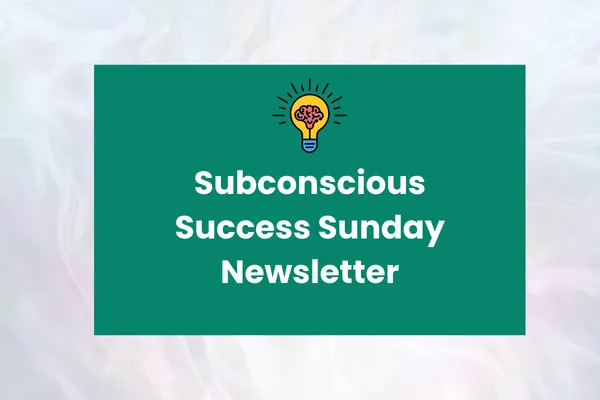Blog
Subconscious Success Sunday Newsletter Archive

Issue 65 - 07/28/24 - Subconscious Success Sunday Newsletter: NLP Tips for Communication ✨
🧡 Want to share this newsletter with a friend or loved one? Direct them to this link so they can sign up too! 🧡
Audio Version:
Text version:
Quote of the Week
“Listen with curiosity. Speak with honesty. Act with integrity. The greatest problem with communication is we don’t listen to understand. We listen to reply. When we listen with curiosity, we don’t listen with the intent to reply. We listen for what’s behind the words.”
-Roy T. Bennett (Author) 🌼
A Little "Pre-Reading" Before This Week's Tip
Ever been curious to learn more about how your mind and brain work?
Well, there are a lot of different popular perspectives from traditional clinical psychology and neuroscience, but have you heard about Neuro Linguistic Programming ("NLP")?
Most people I ask this question to shake their head "no"...so, I thought I'd write about it since a lot of the transformational work I do with clients is based the principles or "pre-suppositions" of NLP.
Created in the 1970s by a computer science & psychology nerd + a linguistics & behavior specialist, NLP laid out a somewhat simple structure of human behavior.
In the book "NLP: The New Technology of Achievement" by Steve Andreas and Charles Faulkner, they noted that if they could summarize all the NLP Presuppositions into one phrase, it would be that "humans work perfectly."
To me, this basically means that our behaviors can be mapped out into a structure/system and are mostly predictable.
As a systems and processes nerd, this is pretty damn exciting as it creates a practical way for us to create inner change and expand our ideas of "what's possible" for us and others.
So....
✨ What if we didn't have to be stuck in suffering or struggle?
✨ What if we can do and learn things we previously thought were not possible for us?
✨ What if we don't have to rely solely on force and willpower to change or create new habits...without having to "try hard"?
✨ What if could expand our ideas about what it actually takes to change our minds, emotions, and behaviors (vs. subscribing to the societal narrative that it has to take a long time, isn't possible, requires struggle, etc.)?
If any of these questions interest you...you might really enjoy these series of newsletters where I share more about NLP principles!
If you haven't yet, check out Issues 61, 62, 63, and 64 where I talked about these pre-suppositions: "the map is not the territory", "every experience has a structure", "if one person can do something, anyone can learn to do it", "the mind and body are parts of the same system", and that "people already have all the resources they need".
And actually...you might really enjoy delving into this inner work for yourself if you haven't yet.
Without further ado, let's dive into today's "NLP Pre-Supposition".
This Week's "Subconscious Success" Tip
Neuro Linguistic Programming Pre-Supposition #6 & #7:
You cannot NOT communicate.
-and-
The meaning of your communication is the response you get.
It's a good reminder that even when we're not using words, we are still communicating with things like our facial expressions, body posture, and overall state of energetic being.
This is really helpful to practice reading if you're someone who works with humans because very often people will say things that they're not actually fully congruent with, and it can be helpful to know when that's the case.
You can also usually gain a person's clarity, comfort, or certainty level about something - which is really helpful when you're coaching or partnering up in some way.
It also helps to keep in mind that everyone interprets life through their inner "mental maps". This means that if we want to be good communicators, it would behoove us to learn different ways of communicating so we can come across clearly to various different types of people.
So when we come across a situation where someone completely misunderstands us, what would it look like to take responsibility (the ability to respond), pause for a moment, and ask yourself "how could I have communicated that differently?".
You can even ask the person: "how do you interpret what I just said?" or "which parts don't make sense?".
How to apply this tip
Here are a few options to start practicing these NLP pre-suppositions:
1. Go check out a nonverbal communication book or training! This list on Reddit is pretty comprehensive if you want to explore from there.
2. Next time you have a convo with someone, take a moment to pay attention more to their body language and facial expressions. Does it match with what they're telling you with their words? Do you notice something you haven't before?
3. Be mindful of how you might be communicating even when you're not speaking. How do you typically carry yourself? What about your facial expressions? Nods? Sighs? Eye contact? All interesting things to pay attention to.
4. Take 7 mins to revisit Issue 45 from my newsletters where I talked about the "4MAT Method" for communication. Plus there's a bonus non-violent communication tip in there for ya.
This method continues to be helpful in all the trainings, marketing copy, and content that I create. It's fabulous for communicating in different ways to cover various learning styles and get more people engaged with what you're sharing.
Why this works (the short version):
90% or more of our behavior is subconscious. You might also remember from Issue 55 that one way to know if the subconscious mind is speaking is that it answers automatically. This is why people use an idiom like "knee jerk reaction".
So when you're communicating with someone, it can be really helpful to notice these automatic reactions before anything even comes out their mouth as a response.
Usually people don't even realize they have non-verbal responses like a slight raise in their eyebrows or curve in their mouth. Or when they take a deep sigh or have multiple nervous ticks.
People's non-verbal cues don't always have to mean something, but it's helpful to just be more aware.
With regards to why communicating in different ways works, there are a couple of things to consider.
Firstly, people have preferences about how they prefer to digest information to maximize clarity and understanding.
Second, it's helpful to remember that each person perceives life through unique filters (subconscious programs). Our brains are meaning making machines, and we are very prone to misinterpreting meanings since we all have different filters.
It's helpful to be aware of this and take responsibility when someone misunderstands what you were trying to communicate in the first place.
Ready to try it?
This week, I invite you to choose at least one conversation where you can practice being more aware of someone's non-verbal cues and also one convo where you are aware of your own. For extra credit, check out my past Issue #45 blog to revisit 4MAT and/or the non-verbal communication books link!
That's it! Have questions about this week's tip? Want to share something with me? Connect with me!
.
Cheers to your success!
-Alina Nikishina
Transformational Coach & Mentor
P.S. Do you have a communication tip to share? Maybe something from the non-verbal category or a tip on how to communicate with more clarity like what I shared above?
Hit reply on this e-mail or DM me on Instagram @heyalinan and share with me!
Here's another one from me I learned a while back: if you want to build trust or rapport with who you're speaking with, make sure your hands are showing when you're talking to them. I'm realizing after sharing this that I have many more small things like this to share! Perhaps in a future newsletter.
Terms & Conditions | Privacy Policy | Disclaimer Policy
Copyright © 2026 Insightful Advisers LLC dba Alina Nikishina

